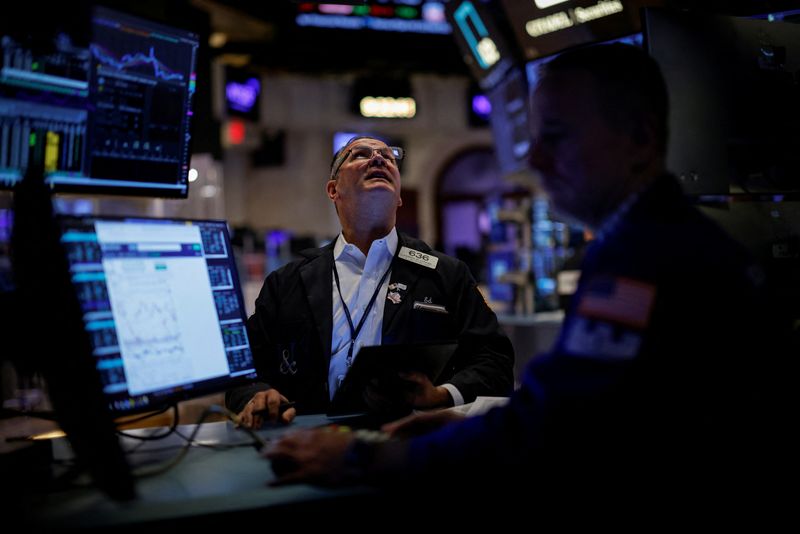Wall Street advances as traders' bets rise for bigger Fed rate cut
By Sinéad Carew and Shashwat Chauhan
(Reuters) -Wall Street's main indexes rose on Friday as investors reevaluated the possibility of a bigger interest rate cut by the Federal Reserve next week, with interest rate sensitive small cap stocks outperforming.
Traders' bets on a 50-basis point rate cut jumped to 47% from 28% on Thursday, CME's FedWatch Tool showed, after former New York Fed President Bill Dudley said late Thursday there was a strong case for a 50-bps interest rate cut.
Media reports had said early Thursday the size of the cut was "a close call."
"There's just rumblings that have started to bubble up again that the discussion in the Fed is leaving 50 basis points on the table," Jim Baird, chief investment officer with Plante Moran Financial Advisors, Southfield, Michigan.
Prior to this, bets on the Fed sticking to a smaller 25-bps cut firmed on Thursday following news of slightly higher producer prices following August consumer prices data.
While the renewed hopes for a bigger cut were boosting large cap indexes on Friday they were most evident in the Russell 2000 small cap index, which was up 2.2%. Smaller companies are more sensitive to interest rate changes as they depend more on borrowed money and floating rate loans.
Baird argued that trading on Friday appeared to show investor optimism that a 50 basis point cut would not indicate a coming recession.
"If investors were looking at this and saying they have to move quicker because they're behind the curve you wouldn't see risk assets like small caps rally," said Baird. "You're seeing some of the riskier areas of the equity market advance pretty strongly today."
As of 02:20 p.m. ET, the Dow Jones Industrial Average rose 335.25 points, or 0.82%, to 41,432.02, the S&P 500 gained 33.65 points, or 0.60%, at 5,629.41 and the Nasdaq Composite climbed 118.78 points, or 0.68%, to 17,688.45.
All 11 S&P 500 sectors rose, led by a 1.3% rise in materials stocks that tracked an increase in the prices of precious metals.
A survey showed U.S. consumer sentiment improved in September as inflation subsided, though Americans remained cautious ahead of the November presidential election.
All three major U.S. benchmark indexes were trading near two-week highs, on track to log solid weekly gains.
Photoshop maker Adobe (NASDAQ:ADBE ), down almost 9%, was the S&P 500's biggest percentage decliner after forecasting fourth-quarter earnings below estimates.
Boeing (NYSE:BA ) shares fell 3% after its U.S. West Coast factory workers walked off the job early on Friday as they overwhelmingly rejected a contract deal.
Chinese e-commerce firm PDD Holdings lost 3% after the Biden administration said it was moving to curb low-value shipments entering the U.S. duty-free under the $800 "de minimis" threshold.
Uber (NYSE:UBER ) gained 5.8% after the ride-hailing platform said it would bring autonomous ride hailing to Austin, Texas, and Atlanta in partnership with Alphabet (NASDAQ:GOOGL )'s Waymo.
Advancing issues outnumbered decliners by a 5.52-to-1 ratio on the NYSE where there were 580 new highs and 25 new lows.
On the Nasdaq, 3,166 stocks rose and 1,022 fell as advancing issues outnumbered decliners by a 3.1-to-1 ratio. The S&P 500 posted 58 new 52-week highs and one new low while the Nasdaq Composite recorded 106 new highs and 47 new lows.
Source: Investing.com
